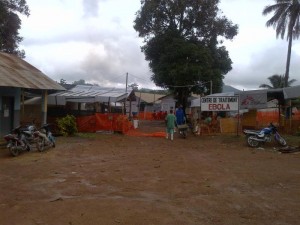
The current outbreak of Ebola in West Africa, which has led to at least 1,200 deaths, poses a number of ethical questions that are both pressing and unfamiliar.
There are currently no approved drugs to treat Ebola. However, new, untested treatments have been given to a few people during this latest outbreak, in the hopes of defeating a disease with a mortality rate of up to 90 percent.
The questions are: how will these therapies be distributed, and who will receive them first?
These issues came into sharp focus when we learned of an experimental treatment with an unapproved drug, ZMapp, manufactured by Mapp, a biopharmaceutical company based in California. It was first given to two American volunteers who came down with the disease in Liberia.
Was it fair to treat these Americans instead of infected Liberians? Is administering an unapproved drug to patients outside a scientifically designed protocol an acceptable approach to learning about the drug’s efficacy and side effects?
A New York Times reporter went even further, asking “What if the first doses of the drug—which had never been used in people and had not even finished the typical animal safety testing—had been given to African patients instead?”
A speculative answer to that question came from a prominent physician-researcher from South Africa, Dr. Salim Abdool Karim. In the Times article, he stated, “It would have been the front-page screaming headline: ‘Africans used as guinea pigs for American drug company’s medicine.’”
The National Health Research Ethics Committee of Nigeria (where five of the deaths from Ebola have occurred to date) has issued a statement endorsing the use of the experimental medication for infected Nigerians, with a plan to embark on a clinical trial as soon as possible. (Read the full Nigerian Health Research Ethics Committee statement, citing the Nigerian National Code for Health Research, which allows such use.)
Meanwhile, Spain also requested and received ZMapp to treat a doctor who became infected in Liberia. That doctor has died, but it is not clear whether or not he received the treatment. And on August 19, the BBC reported that two Liberian doctors and one Nigerian doctor who contracted the disease in that country are recovering after receiving ZMapp.
On August 11, the World Health Organization (WHO) convened a panel to consider and assess the ethical implications for clinical decision-making in this situation. Reporting on the deliberations, the WHO panel reached consensus that it is ethical to offer unproven interventions—with as yet unknown efficacy and adverse effects—as potential treatments or prevention efforts. However, the panel declined to make specific recommendations of who should be first to receive this experimental drug, which is in very short supply until more can be manufactured.
On this last point, the panel noted that more-detailed analysis and discussion are required to arrive at “ethical criteria for achieving fair distribution in communities and among countries, in the face of a growing number of possible new interventions, none of which is likely to meet demand in the short term.”
This is one of the most vexing ethical questions in health policy: how to set priorities for urgently needed drugs that are in short supply.
In an epidemic such as an outbreak of Ebola—a highly infectious disease with a high fatality rate—treatment is needed quickly for healthcare workers and those in other critical occupations. These people help others survive the onslaught of such a deadly disease. However, if some members of these occupations are too sick to recover in time to assume their essential tasks, other people should be treated first.
The need for these drugs is greatest in the countries where the epidemic is raging. Their residents come first. Because clinical trials for safety and efficacy can be carried out only in such countries, even the “compassionate use” of an unproven drug in severely limited supply should be granted first to inhabitants of the nations that have been most severely affected. National and local governments and nongovernmental organizations have a responsibility to reassure the people who live in a country experiencing an epidemic that they are not being exploited by a Western pharmaceutical company when properly designed clinical trials are proposed, nor is their suffering being ignored.
Although unethical clinical trials have been conducted in the past in developing countries, today the whole world is watching the Ebola epidemic and the initial steps being taken to treat infected individuals in an effort to make sure that those injustices don’t happen again.


Comments on this entry are closed.
On the one hand it makes sense to wait for properly tested drugs before using them on people. On the other hand, it seems like any drug we can get that might work would be a good idea to try. With a 90% mortality rate, it’s not like the drugs are necessarily going to hurt anything…